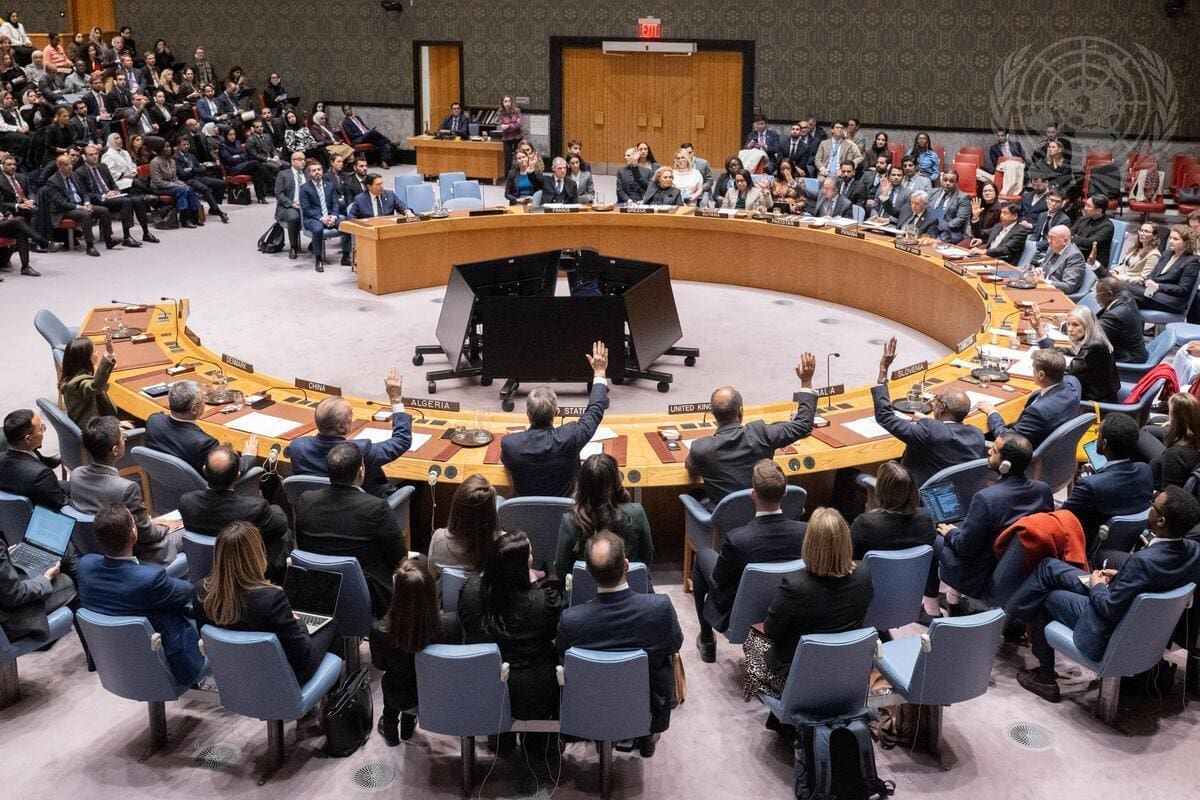
Introduction
On November 17, 2025, the UN Security Council passed Resolution 2803 endorsing US President Donald Trump’s twenty-point plan for Gaza. The vote follows weeks of political pressure and Washington’s cajoling of Security Council members. The resolution ultimately passed with 13 votes in favour and two abstentions, from Russia and China.
In addition to an overall endorsement of the plan, the resolution calls for the establishment of two supposedly “transitional” bodies to take control of Gaza. The first is the Board of Peace (BoP), a governing body tasked with overseeing aid delivery, reconstruction, and day-to-day administration. The second is the International Stabilization Force (ISF), mandated to take over security and disarm Hamas until the Palestinian Authority (PA) undergoes what the plan deems satisfactory reform. Notably, the resolution does not refer to the genocide of the past two years, nor does it address accountability for it.
Ultimately, the UNSC resolution repackages colonial control over the Palestinian people in Gaza, who have faced more than two years of genocide at the hands of the Israeli regime. Rather than seize this moment to pursue justice and accountability and set a precedent for humanity, the UN—through its Security Council—has once again chosen to contravene its own norms and principles in the face of US pressure and near-total global deference to Trump. Indeed, it rewards the US, a co-perpetrator of genocide, with control over Gaza and its potentially lucrative reconstruction process, while simultaneously relieving the Israeli regime of all of its responsibilities as an illegally occupying force.1
A New Form of Colonial Oversight
The details of the BoP’s governance structure remain opaque. Although Trump has designated himself as chair, the other members have not yet been confirmed. Reports indicate that former UK Prime Minister and war criminal Tony Blair will be involved; his think tank, the Tony Blair Institute, has been developing a plan for Gaza’s governance and reconstruction for some time. There are also indications that Jared Kushner, Trump’s son-in-law and a key broker of the Abraham Accords, will play a role.
Notably absent from the Board of Peace’s design is any meaningful system of accountability—whether to Palestinians, to international institutions, or to universal legal standards Share on XUnder this emerging structure, Palestinian participation is expected to be tightly limited and heavily conditioned. Trump’s plan confines it to “technocratic” and “apolitical” roles, subject to continuous external supervision and effectively excluding any representatives with democratic legitimacy or political agency. Notably absent from the BoP’s design is any meaningful system of accountability—whether to Palestinians, to international institutions, or to universal legal standards.
The BoP is to have complete authority over the distribution of humanitarian aid in Gaza. All international organizations and UN agencies—including those with long-standing mandates, such as UNRWA—would be required to operate under the BoP’s oversight. In effect, the body would gain decisive control over who receives aid and under what conditions. For a population rendered entirely dependent on humanitarian assistance because of the ongoing genocide, such centralized control carries grave implications. Aid has long been weaponized in Palestine, but the UN resolution grants an unprecedented degree of external control over who survives, who starves, and who gains access to basic services.
The BoP is also responsible for overseeing Gaza’s reconstruction. However, statements from US officials—including Vice President JD Vance—indicate that reconstruction will be permitted only in areas where Hamas is “not operating.” In practice, this confines reconstruction to areas under ISF control. Under the current ceasefire agreement, Israeli regime forces have delineated an invisible withdrawal boundary referred to as the “yellow line.” The land beyond this boundary comprises approximately 53 % of Gaza, including most of its agricultural and industrial zones. This area, which the Israeli regime calls a “Hamas-free zone,” has been almost entirely depopulated by occupation forces during the genocidal campaign. Presumably, this is the area where the ISF will be deployed first. As a result, reconstruction will be limited to these US-Israeli-controlled zones, while the rest of Gaza is left to permanent ruin. In effect, this approach entrenches the demographic engineering already underway, facilitating the continued ethnic cleansing and forced displacement of Palestinians in Gaza.
UNSC Resolution 2803 must be rejected as an act of political coercion and an endorsement of US colonial control over Gaza Share on XAs with the BoP, it remains unclear who will provide personnel for the ISF, but it is envisioned as a multinational force with a unified command answerable to the BoP. The Trump administration has made it clear that there will be no US boots on the ground—a position echoed by European governments. Meanwhile, Egypt, Qatar, and the UAE have all been approached to contribute troops, but have not committed. What is clear is that the ISF will wield far-reaching authority to enforce what the resolution calls “the security and demilitarization of the Gaza Strip,” effectively serving as a protectorate and an enforcement arm for the Israeli regime’s occupation and ongoing siege of the territory.
Accountability and Palestinian Inclusion
Although a second ceasefire was declared on October 9, 2025, the Israeli regime has continued to violate it—at least 280 times at the time of writing—resulting in hundreds of Palestinians killed. The destruction to Gaza’s infrastructure, including its health and education systems as well as the built and natural environment, is colossal. Palestinians in Gaza continue to be killed, maimed, and displaced. Indeed, the genocide has not stopped with the ceasefire; it has merely fallen out of the headlines.
While the UN has consistently failed the Palestinian people, this resolution represents a deeper erosion of the institution. It tramples the legal foundations and norms of the international system. First, it violates the inalienable rights of the Palestinian people to resist colonial occupation, to sovereignty, and to a dignified life in their homeland. Second, it erases the genocide and offers no recourse for accountability. The resolution must therefore be rejected as an act of political coercion and an endorsement of US colonial control over Gaza. In practice, it is a repackaged form of colonial domination presented as peacemaking.
In practice, the UNSC Resolution 2803 is a repackaged form of colonial domination presented as peacemaking Share on XWhat is needed most at this juncture is accountability for the genocide and for those who have aided and abetted it. Equally essential is support for a Palestinian-led vision for recovery. One example is the Phoenix Plan, published in January 2025 by a group of Palestinian experts from various disciplines. This collaborative effort brings together voices from Gaza, the West Bank, and the diaspora to outline a short- to medium-term reconstruction plan. Crucially, it includes individuals from Gaza’s municipalities—those with intimate knowledge of local communities and direct experience of the realities on the ground.
The Phoenix Plan is an example that stands in stark contrast to the UNSC resolution, which sidelines Palestinians from the design, leadership, and implementation of a self-determined vision of reconstruction. Beyond being Palestinian-led, the plan represents an act of future visioning in the face of annihilation and global indifference. Recognizing and supporting this kind of Palestinian agency is essential to any meaningful process of recovery, which directly counters the colonial logic underpinning UNSC Resolution 2803.
- To read this piece in French please click here. Al-Shabaka is grateful for the efforts by human rights advocates to translate its pieces, but is not responsible for any change in meaning.
Yara Hawari is Al-Shabaka’s co-director. She previously served as the Palestine policy fellow and senior analyst. Yara completed her PhD in Middle East Politics at the University of Exeter, where she taught various undergraduate courses and continues to be an honorary research fellow. In addition to her academic work, which focused on indigenous studies and oral history, she is a frequent political commentator writing for various media outlets including The Guardian, Foreign Policy, and Al Jazeera English.









